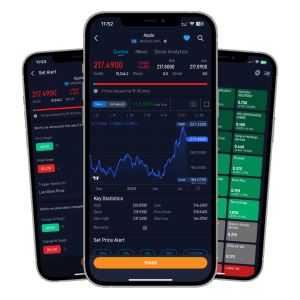Trade Stocks, DLCs, ETF and Structured Warrants on POEMS Global MY 3.0
Stocks
Phillip Capital provides innovative financial services and seamless access to 10+ global exchanges. As a client, enjoy trading multiple stock counters on a single platform with reliable broking and execution services. Access fast connections to global equities markets, including Malaysia, United States, Hong Kong, Australia, and Singapore, as well as IPOs, ETFs, Warrants & DLCs.
Why POEMS Global MY 3.0?
-
Global Markets
Empower your trading and investment via access to global markets. You can build a watchlist that comprises of your favourite counters -
Exchange Top 30 Movers
Quickly identity and track the daily performance of equities of various exchanges -
Personalised Interface with Integrated Trading Tools
Mix and match, re-arrange and customise your workspaces exactly how you want them.
-
Stocks Analytics
Insightful analytical data and company valuation to help you pick the right stocks -
Global Chart Live
A suite of valuable charting features equipped for all kinds of technical analysis -
Multi-lingual Interface
Get market updates from a wide range of news sources and receive news according to your preferred counters in Watchlists
*Available in English & Chinese
Stocks Trading Platforms

POEMS Global MY 3.0
We are thrilled to inform you that POEMS Global MY 3.0 is now readily accessible for download on both mobile and desktop. With its diverse essential features, POEMS Global serves as the perfect tool to assist investors in making informed trading decisions.
Frequently Asked Question
A stock is a security that represents ownership equity in the issuing corporation. Stocks are listed and transacted on stock exchanges such as the Bursa Exchange, Singapore Exchange, Hong Kong Exchange, Australian Securities Exchange and New York Stock Exchange.
Trading of Stocks and other investment products can carry a high level of risk, and is more suitable for customers with medium to high risk profile. It is important you understand the possible risks involved in trading Stocks, which include but are not limited to the following:
Equity Risks
Equity Price Risks refers to the risk of losses because of adverse movements on the prices of securities. The market price of a stock moves as a result of supply and demand factors. If demand on a stock outpaces its supply, with all other factors remaining the same, the price of the stock is expected to increase. Vice versa, if the supply is greater than the demand, we expect the price of the stock to fall. A stock price can fall to zero. In other words, the stock loses its entire value and shareholders will lose their entire investment.
Concentration Risks
Concentration Risks refers to the potential for loss arising from concentration in a single stock, sector and/or geographical region. For example, if a portfolio only consists of stocks in the tourism sector, it could be excessively exposed in the event of a health pandemic that will negatively impact the price of stocks in the tourism sector.
Liquidity Risks
Liquidity Risks arises when investing into stocks with low traded volume. Liquidity refers to how easily a stock can be bought or sold in the market. Investors may find it difficult to sell stocks which have poor liquidity and may end up exiting the position at an unfavourable price.
Foreign Exchange Risks
Foreign Exchange Risks occurs from the change in value of one currency in relation to another. There are several ways foreign exchange volatility can impact total returns. For example, a rising Malaysian Ringgit can negatively impact returns when an investor in Malaysia invests in a US dollar denominated stock. However, a rising Ringgit also means an investor in Malaysia will need to pay less to make the transaction.
Interest Rate Risks
Interest Rate Risks refers to the potential loss resulting from a change in interest rates of the country where the stock is domiciled. An increase in interest rate may not have a direct impact on the stocks but it could see both consumers and businesses reduce spending. An increase of interest rates may see more investors turn to other asset classes such as fixed-income securities.
A Corporate Action is an event that brings about a material change to the underlying stock, or an event that is initiated by a firm that has an impact on its shareholders.
Cash Dividends
A Cash Dividend is cash payment to shareholders by the company from profits or retained earnings. The frequency and amount will depend on the company’s performance. If you hold a Security to its Ex-dividend date, you will be entitled to the cash dividends after Payment date.
Bonus Issue
A Bonus Issue is an issuance of bonus shares by a company to entitled shareholders. If you hold a Security to its Ex-bonus date, you will be entitled to the bonus issue after Payment date.
Shares Consolidation
A Shares Consolidation, or a Reverse Stock Split, reduces the number of shares held by existing shareholders. The share price will increase proportionally. If you hold a Security to its effective date of consolidation, your positions and average traded price will be adjusted to reflect the consolidation. Adjustments for exchanges operating in the Asian time zone will be made after the close of trading, one trading day prior to effective date of consolidation. Adjustments for AMEX, NASDAQ and NYSE will be made before the commencement of trading on the effective date of consolidation.
Following a consolidation, if the adjustments have been made before the commencement of trading of the share, the “Unrealised P&L (Non-Leveraged)” indicator may reflect a reduced amount on the trading platform. This is a result of the mark to market of the adjusted average traded price against the pre-consolidation share price. This will not have an impact on the account balance as the unrealised Profit and Loss (P&L) for Securities will not be added or removed from it.
Stock Split
A Stock Split increases the number of shares held by existing shareholders. The share price will be divided proportionally.
If you hold a Security to its effective date of the split, your positions and average traded price will be adjusted to reflect the split. Adjustments for exchanges operating in the Asian time zone will be made after the close of trading, one trading day prior to effective date of the split. Adjustments for AMEX, NASDAQ and NYSE will be made before the commencement of trading on effective date of the split. Following a split, after adjustments have been made but before the commencement of trading of the share, the “Unrealised P&L (Non-Leveraged)” indicator may reflect an inflated amount on the trading platform. This is a result of the mark to market of the adjusted average traded price against the pre-consolidation share price. This will not have an impact on the account balance as the unrealised P&L for Securities will not be added or removed from it.
Rights Issue
A Rights Issue is an offering to existing shareholders by a company to purchase additional shares/warrants in proportion to their existing holdings, usually at a subscription price which is discounted relative to the current market price.
If the rights are renounceable, they may be tradable for a short period of time.
Shareholders will be allowed to exercise the rights. Rights that are unexercised by the deadline stipulated by us, shall be deemed to have lapsed.
Phillip Capital Sdn. Bhd. reserves the right to enable trading of renounceable rights.
Please visit the link here to know more about share margin financing.
Trade orders can be placed using the following methods:
- Self-execution via our trading platform
- Call-in service: Phillip Capital Dealing Desk at 03-2783 0288.
Daily Leveraged Certificates (DLCs) are structured financial instruments issued by banks and traded on the securities market. They provide investors with the opportunity to capitalize on both rising and falling markets, offering fixed leverage ranging from 3 to 7 times the daily performance of the underlying asset, calculated on a daily basis. For instance, if the underlying asset moves by 1% from the previous trading day’s closing price, the value of a 5x DLC will change by 5% (before costs and fees). Common underlying assets include market indices or individual stocks.
DLCs are intended for investors who can accept the risk of significant losses, potentially up to the full principal amount in a short time. Investors should have a thorough understanding of the product and either extensive knowledge or experience in trading to assess the structure, risks, costs, and returns. DLCs aim to deliver short-term results by amplifying the daily performance of the underlying asset.
Due to their complexity and high risk, DLCs are only suitable for those with knowledge of advanced financial products and a high risk tolerance.
Characteristics of DLCs
- Fixed leverage of 3, 5 or 7 times
- Relatively low capital outlay and loss is limited to amount invested
- Traded on exchanges with transparent pricing and structure
- No margins required
- No implied volatility impact and time decay impact
Features of DLCs:
- Trade in Both Bull and Bear Markets: DLCs offer two types—long and short—allowing investors to profit from both rising and falling markets. A long DLC benefits from rising prices, while a short DLC benefits from falling prices.
- Limited Lifespan: DLCs have a finite lifespan, with the final value automatically paid out at expiry. On SGX, DLCs have a maximum tenure of 3 years
- Compounding Effect: When held for multiple days, the return of a DLC may vary from its leverage factor due to the daily price reset, which aligns with the underlying asset’s closing level from the previous trading day.
- Airbag Mechanism: The DLC includes an airbag mechanism to slow the rate of loss during extreme market conditions. Each DLC has a pre-set trigger for this mechanism, typically activated by a 10% move in the underlying index for a 5x DLC or a 20% move for a 3x DLC, based on the previous trading day’s closing price. The airbag is triggered only when the underlying index moves against the product. For instance, a 20% drop in the index will trigger the airbag for a 3x Long DLC, but not for a 3x Short DLC, which would rise by 60% instead.
3x Long and Short DLCs on the Magnificent 7 US Stocks
- First-of-its-kind in Asia offering investors a fixed leverage exposure of 3 times the daily performance of the underlying stock (payoff is exactly the same as L&I ETFs that are growing in popularity in the US)
- Long-Short exposure to trade both market directions or for hedging purposes, and are tradable in both USD or SGD currency
- Asian-hour exposure to the Magnificent 7 Stocks to provide greater trading flexibility in the case of high-impact news during Asian hours (SGX 9am-5pm trading window)
- During Asian hours, DLC performance tracks the US stock price traded on Alternative Trading Systems and this underlying prices are available on our DLC website
Why trade Stocks with Phillip Capital?
Experience One of Malaysia’s Best Online Stock Trading Platforms
Phillip Capital Malaysia is a leading online stock trading platform recognized for its diverse investment options, including stocks, futures, IPOs, warrants, and ETFs. Our platform provides extensive research resources and advanced trading tools, ensuring investors can make informed decisions.
With a user-friendly interface and 24/5 customer support, Phillip Capital is the go-to choice for those looking to trade stocks in Malaysia. Explore our offerings in futures trading in Malaysia and CFD trading in Malaysia. Open your free stock trading account today and take the first step toward achieving your financial goals!
Trade Stocks in Malaysia: Choose Phillip Capital as Your Trusted Stock Broker
At Phillip Capital, we help traders achieve profitable investment outcomes with our top-rated services. Our online stock trading platform in Malaysia offers features like customizable watchlists, real-time data, and low commission fees, making it ideal for cost-conscious investors.
Join us on our trading platform in Malaysia and start your investment journey now! We also provide comprehensive educational resources and market insights to enhance your trading skills. Whether you’re a seasoned trader or just starting, Phillip Capital is committed to supporting your investment journey with the tools and knowledge you need to succeed.
By choosing Phillip Capital, you’re not just opening an account; you’re joining a vibrant community of traders and a leading stock broker in Malaysia. Connect with like-minded individuals, share insights, and benefit from our interactive forums and events designed to foster collaboration and growth in your trading journey.






